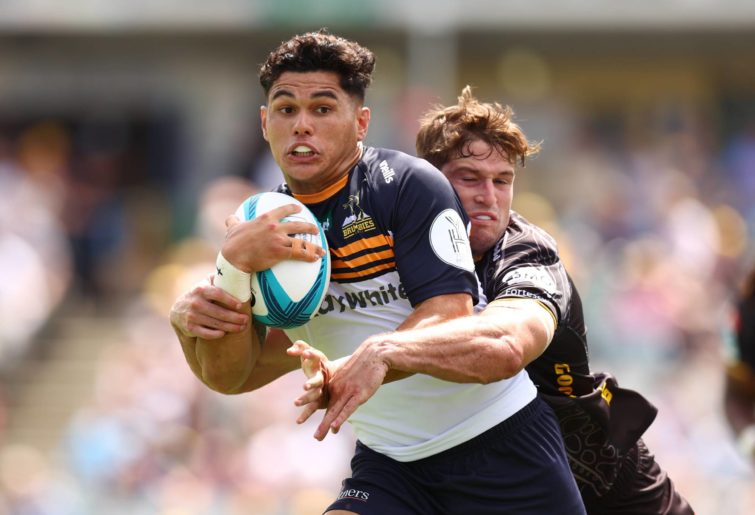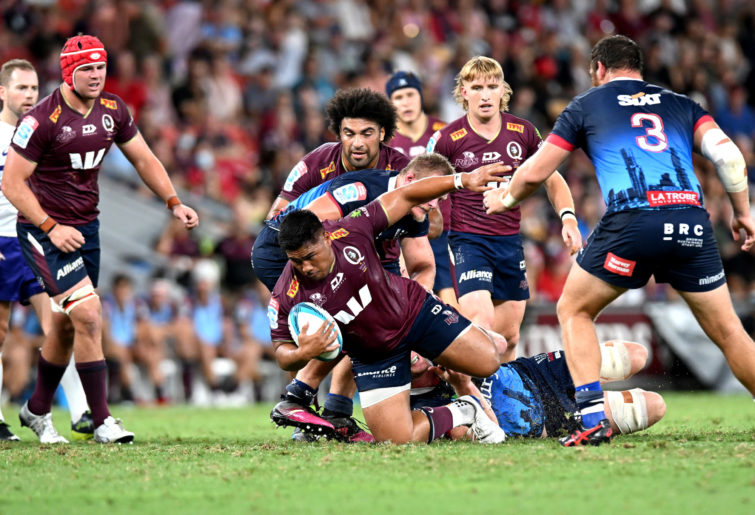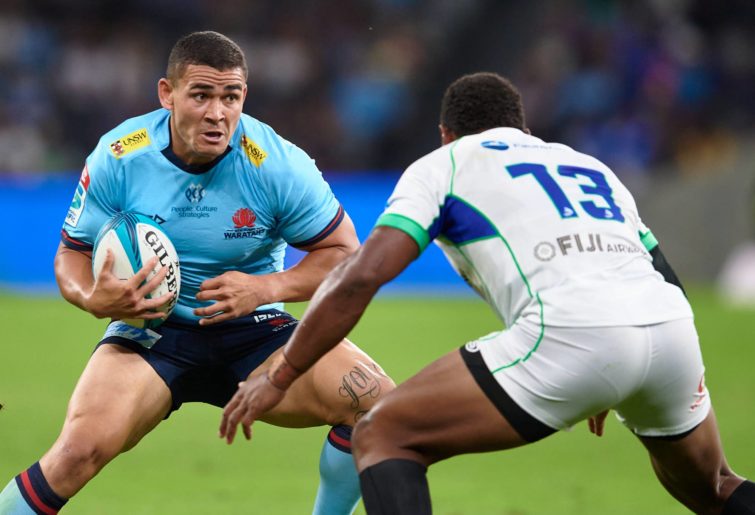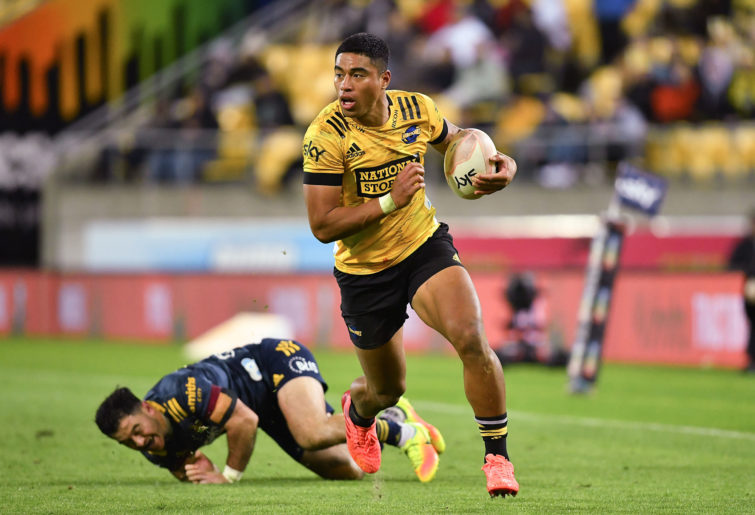To be honest, it had all been a bit underwhelming. Crowds being locked out in New Zealand, newcomers the Drua being brave but outclassed and the Rebels being unable to hold onto the ball, even before monsoonal rain drenched Suncorp Stadium, had made for a choppy beginning to the season.
That is until the Brumbies and Force did justice to a sunny Canberra afternoon, putting on a bright, highly competitive match complete with a grandstand finish, the Brumbies getting up at the death 29-23.
There’s something about Sunday afternoon football that appeals to just about everybody I know, yet like a forgotten child, matches pop up far too infrequently on the schedule.
This one hung on the Force not getting enough reward for dominant field position in the first half, achieved largely courtesy of a misfiring Brumbies lineout. Even so, the Brumbies still found it in themselves to notch up a couple of trademark lineout maul tries, the second one to Rory Scott effectively a 14-point play that came straight after Kane Koteka had galloped into wide open spaces with support either side only for the pass from Issak Fines-Leleiwasa to be harshly ruled forward.
With the Brumbies gradually asserting dominance in the second half, the Force stayed in the fight – do they ever not stay in the fight? – and when Jake McIntyre finished off a superb team try, they led by a point with only three minutes to play.
The Brumbies were always going to have one last crack, and in truth it came a bit too easily, gathering numbers on the right, for Lachlan Lonergan to run in the winning score. In a cruel twist of fate it was Izack Rodda, otherwise superb in his return to Super Rugby, who fell off Tom Banks to allow the overlap.
Banks wasn’t always as tidy, but it is worth remembering that the reason both he and Reece Hodge, who had a horror night in Brisbane, played like men who hadn’t had a game in months is that they hadn’t. Both will be far better for the run. Be kind.
This will feel like an opportunity wasted for the Force, but the big fish, Paul Tito, has their attacking and defensive lineout humming, and they are clearly going to provide headaches for all opposition this season.
As ever, Brumbies skipper Allan Alaalatoa, delighted to bank the points, was “proud of the boys”.

(Photo by Mark Nolan/Getty Images)
In Brisbane the Reds also had some of their old lineout issues come back to haunt them, but some of their run and support play – particularly before the big wet set in – was impressive.
The Rebels were very disappointing, but jumping to conclusions that they have reverted to a stodgy, ultra-conservative approach is misguided. For one, they were criticised here for not kicking points on offer in the first half – fair enough, but not when coming from some of the same critics who lambasted them last year for taking those points and not going for tries.
No rugby side is going to apply any pressure on a defence if they can’t catch the ball, and here is where the match started and ended. The Rebels’ other area of concern was the lack of breakdown presence and go-forward, and both of these things will need to be fixed before they can contend.
It will be a busy week for the citing commissioner, called upon to rule on a dangerous ‘no arms’ shoulder tackle by referee Angus Gardner on the excellent Harry Wilson in the second half. Pre-empting judiciary outcomes is always fraught with danger, but if consistency is to be applied, Gardner should be looking at six weeks reduced to three for an early guilty plea and a clean record.

(Photo by Bradley Kanaris/Getty Images)
Thankfully the worst of the rain stayed away from Friday night’s opener in Parramatta until after the final whistle, the Waratahs spoiling the Fijian Drua’s maiden Super Rugby appearance with a comprehensive 40-10 victory.
The Waratahs did exactly what was required of them, executing well at set piece and moving the ball with confidence. A returning Jed Holloway was terrific value, and with Michael Hooper enjoying an extended preseason, Charlie ‘Escobar’ Gamble made the most of his starting opportunity.
Unable to engineer enough fractured play situations, it was a frustrating night for the Drua, but it must be remembered that, without exception, every new side to Super Rugby has needed time to adjust to the pace and style of game played. There will be better days ahead.
Also still shaking off some preseason rust were the Stan commentary team, with match caller Sean Maloney totally missing Will Harris sneaking in for the season-opening try and Tim Horan elevating the Drua to Fiji’s national team. Horan did redeem himself, though, when footage emerged of him having invited city slicker Drew Mitchell to his farm, suckering him into cleaning the soiled backsides of his beef herd with a bucket of soapy water and a cloth.

(Photo by Brett Hemmings/Getty Images)
Events in New Zealand reminded us just how much COVID still has a stranglehold on this competition, with one match cancelled and the others played in empty stadiums, albeit for a crowd of Queenstown locals pressed up against a cyclone wire fence, beers in hand.
Ironically this meant spectators were hemmed in far closer together than they would have been had they been allowed inside to sit on the bank, but hey, there’s no arguing against science.
Brodie Retallick announced his Super Rugby return with an exquisite back-door pass, and already, with this 26-16 win under their belt, the Chiefs look to have kicked on well from last year. By contrast, the Highlanders were hamstrung by poor exits and a lack of respect for the ball, with too many players clutching at passes with one hand instead of having both out in front of them.
In pristine conditions at Dunedin’s Forsyth Barr Stadium the Crusaders always seemed to have matters under control, seeing off the Hurricanes 42-32. There was plenty of good in there for Hurricanes fans too, with three tries ruled out on review, Jordie Barrett looking to have returned in great fettle, and ex-schoolboys star Brayden Iose looking the business after coming on at flanker.

(Photo by Mark Tantrum/Getty Images)
Regular readers will know of this writer’s concern that sports administrators are not acting decisively enough to minimise concussion incidences, potentially exposing players to serious health implications later in life. But while better informing participants and fans on all aspects relating to head injury is undeniably positive, it can lead to pile-ons that, even if well intended, sometimes miss the mark.
Damon Murphy isn’t everyone’s favourite referee, but the pasting he copped from all directions last week after he encouraged an English medico to move a potentially concussed Jack Nowell along in the Test match against Italy was grossly unfair.
Murphy’s ‘crime’ was that he showed disregard for player safety by prioritising speeding up the game over player safety. The point being missed by critics is that there is already a head injury assessment process to assess players suspected of being concussed. It is by stealth that medics have introduced a second, initial on-field assessment into the mix to hold up the game to assess whether or not a player should be sent for an assessment.
This is plain nonsense. After a reasonable amount of time Murphy was quite entitled to ask Nowell and his medic to leave the ground for the HIA or, if they were still waiting for an opinion from another doctor off TV replay, to do so on the sideline. Or to play on.
It was not Murphy who put Nowell at risk by allowing him to stay on the field – that was still a decision for the doctor who, in this case, seemed to be hedging his bets, reluctant to send Nowell for a HIA if it wasn’t conclusive that he needed one. Whatever happened to ‘if in doubt, sit them out’?
The Six Nations were quick to jump on speculation during the week that South Africa will be joining their number after 2025, likely at the expense of Italy. Their firm rebuttal statement seemed to be missing only a reference to their position having the ‘full support of the board’. For cynical observers, this only confirmed the speculation as truth.
Behind all of this chest-thumping and dick-swinging is the spectre of private equity firm CVC, which recently acquired 14.3 per cent of the Six Nations and which, not unreasonably, might be seeking to leverage its investment by turfing out a perennial underperformer for the current World Cup champion.
Rather than reinforce the stereotypical view that all private equity is evil, the danger for rugby is not CVC’s involvement with the Six Nations, as it is for Silver Lake’s investment in New Zealand Rugby and likely partnership with Rugby Australia. Rather it is the lack of cohesion that occurs around multiple investments into rugby, which leads to specific, individual agendas being pursued at the expense of a joined-up vision and overall beneficial outcome for the sport.
Our experts Brett McKay, Harry Jones and Geoff Parkes cast their eye over the Super Rugby contenders in episode 1 of our new podcast. Click below to play, or follow on Spotify.
It makes no real difference which bed South Africa lies in after 2025 if the foundations aren’t solid in the first place. A properly thought out and equitable global season can provide for positive rugby outcomes for all major international and club competitions.
The alternative – single investors or competitions driving outcomes for their own benefit, with national unions condoning that – will only create selfish winners and pitiable losers. Think Formula 1 in motorsport, the India-England-Australia axis in cricket or Phil Mickelson and Greg Norman and the Saudi Arabian golf vibe.
It is here where World Rugby’s inability to broker a global season is laid bare. Their inability to achieve meaningful progress has invited private equity firms to step in and do the job for them, just without any big picture focus or any sense of obligation to rugby’s best interests.
There is still time for World Rugby to put an effective structure in place, but the clock hands are now sitting very close to midnight.
After a lengthy stand-off, New Zealand Rugby has finally got their private equity deal over the line. On the surface that’s an improved valuation for New Zealand Rugby and a win for David Kirk and the players association, albeit that the player share of the pie hasn’t grown since the initial proposal.
Not surprisingly, reaction from the New Zealand rugby public has been muted and suspicious, with cries that they’re in it only for the money being particularly popular. Well yes, but if Silver Lake make money out of the partnership, this means that New Zealand Rugby will be making substantially more!
Another misplaced fear is the selling off of the All Blacks jersey. Silver Lake’s is not a vanity play but an equity play. They make more by staying off the jersey and selling the front sponsorship to someone who is interested in a vanity play, like Mohed Altrad, for example.
Many of those same fears exist in Australia, where fans now await a similar outcome. Confirmation in May of the 2027 World Cup hosting rights should help leverage a healthy valuation for Rugby Australia. They’ll need it, because a chunk of the cash will be required to extinguish a considerable short-term debt facility.
That’s clearly not what any business would choose to use private equity capital for, but alternatives are thin on the ground. And if it all gets too messy, perhaps we can rely on Drew Mitchell to clean it up using his bucket and cloth.
































































































